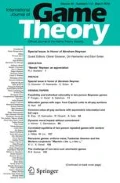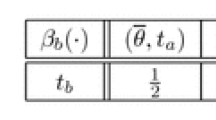Abstract
In earlier work, the authors showed that a pure-strategy Bayesian-Nash equilibria in games with uncountable action sets and atomless private information spaces may not exist if the information space of each player is not saturated. This paper sharpens this result by exhibiting a failure of the existence claim for a game in which the information space of only one player is not saturated. The methodology that enables this extension of the necessity theory is novel relative to earlier work, and its conceptual underpinnings may have independent interest.




Similar content being viewed by others
Notes
In alphabetical order, see Carmona and Podczeck (2009), Keisler and Sun (2009), Loeb and Sun (2009), Podczeck (2009), and for more recent work in chronological order Wang and Zhang (2012), He and Sun (2014), He et al. (2013), Qiao and Yu (2014), Khan et al. (2013a, b, 2014a, b), Khan and Zhang (2014), Greinecker and Podczeck (2015), Sun and Zhang (2015). All of this work revolves around so-called saturated or super-atomless probability spaces, the measure-theoretic property that constitutes the subtext of this work.
Keisler and Sun (2009) take their cue from the saturation property formalized in Hoover and Keisler (1984) in the form of a saturated filtration, a motivation that cames from the need for a systematic study of the existence of strong solutions for stochastic integral equations; see Fajardo and Keisler (2002) for a comprehensive discussion which connects the property to Maharam’s classification of measure algebras. For an approach to the subject that begins with Maharam, and thereby refers to the intrinsic super-atomless property of a probability space, see Carmona and Podczeck (2009), a paper that also has a synthetic thrust.
See the recent work of the authors Khan and Zhang (2014) and of He and Sun (2014), and prior to them, to Khan and Sun (2002), and its full set of references, for the earlier work involving Loeb spaces. Also see He et al. (2013) and Greinecker and Podczeck (2015) and their references. We comment on this work below.
Also see the description in the last but one paragraph in Radner and Ray (2003). Relative to the earlier 1974 work of Aumann’s, the RR work in a setting where the players’ payoffs depend on individual types or private information, and also consider information part of which is public, but we abstain from this latter aspect here.
Since Loeb spaces are saturated, the sufficiency result generalizes previous work; see Khan and Zhang (2014).
We are grateful to an anonymous referee for emphasizing Fremlin’s treatment, and specifically his Definition 331A. This concept is presented in He and Sun (2014) under the phraseology that “\(\mathscr {F}_i\) is setwise coarser than \(\mathscr {T}_i\)”.
Here \(\mathscr {T}^S\) is the \(\sigma \)-algebra \(\left\{ S\cap S' :S' \in \mathscr {T} \right\} \) and \(\mu ^S\) is defined on \(\mathscr {T}^S\) by \(\mu (\cdot ) = \mu (\cdot ) / \mu (S)\). The reader is referred Khan and Zhang (2014) for details and references.
There always exists such a function \(h_i\), see (Bogachev 2007, Proposition 9.1.11) .
For the latter, think of a function h manufactured on 2n intervals of the interval, and with a tent-map on each of the n pairs of intervals. For the dynamics of such maps, see Brucks and Bruin (2004).
We suppress the fact that the game \(\varGamma _{h_1, h_2}\) also depends on \((T_i, \mathscr {T}_i, \mu _i),\; i=1,2.\)
We are grateful to an anonymous referee for this observation.
This RR example, just like the KRS example, does not satisfy the main assumption in Grant et al. (2015), for example.
See e.g. Lemma 4 of Khan and Zhang (2012).
References
Bogachev VI (2007) Measure theory, vol II. Springer-Verlag, Berlin
Brucks KM, Bruin H (2004) Topics from one-dimensional dynamics. Cambridge University Press, Cambridge
Carmona G, Podczeck K (2009) On the existence of pure-strategy equilibria in large games. J Econ Theory 144:1300–1319
Fajardo S, Keisler HJ (2002) Model theory of stochastic processes. Peters AK Ltd, Massachusetts
Fremlin DH (2002) Measure theory: measure algebras, vol 3. Torres Fremlin, Colchester
Fu HF (2008) Mixed-strategy equilibria and strong purification for games with private and public information. Econ Theory 37:521–432
Grant S, Meneghel I, Tourky R (2015) Savage games. Theor Econ
Greinecker M, Podczeck K (2015) Purification and roulette wheels. Econ Theory 58:255–272
Hoover D, Keisler HJ (1984) Adapted probability distributions. Trans Am Math Soc 286:159–201
He W, Sun X (2014) On the diffuseness of incomplete information game. J Math Econ 54:131–137
He W, Sun X, Sun YN (2013) Modeling infinitely many agents, working paper. National University of Singapore
Keisler HJ, Sun YN (2009) Why saturated probability spaces are necessary. Adv Math 221:1584–1607
Khan MA, Rath KP, Sun YN (1999) On a private information game without pure strategy equilibria. J Math Econ 31:341–359
Khan MA, Rath KP, Sun YN (2006) The Dvoretzky-Wald-Wolfowitz theorem and purification in atomless finite-action games. Int J Game Theory 34:91–104
Khan MA, Rath KP, Sun YN, Yu H (2013) Large games with a bio-social typology. J Econ Theory 148:1122–1149
Khan MA, Rath KP, Sun YN, Yu H (2014) Strategic uncertainty and the ex-post Nash property in large games. Theor Econ
Khan MA, Rath KP, Yu H, Zhang Y (2013) Large distributional games with traits. Econ Lett 118:502–505
Khan MA, Rath KP, Yu H, Zhang Y (2014) Strategic representation and realization of large distributional games. Johns Hopkins University
Khan MA, Sun YN (2002) Non-Cooperative games with many players. In: Aumann RJ, Hart S (eds) Handbook of game theory, vol 3. Elsevier Science, Amsterdam, pp 1761–1808
Khan MA, Zhang Y (2012) Set-Valued functions, Lebesgue extensions and saturated probability spaces. Adv Math 229:1080–1103
Khan MA, Zhang Y (2014) On the existence of pure-strategy equilibria in games with private information: a complete characterization. J Math Econ 50:197–202
Khan MA, Zhang Y (2015) On pure-strategy equilibria in games with correlated information. Johns Hopkins Unversity, Mimeo
Loeb PA, Sun YN (2009) Purification and saturation. Proc Am Math Soc 137:2719–2724
Milgrom PR, Weber RJ (1985) Distributional strategies for games with incomplete information. Math Oper Res 10:619–632
Podczeck K (2009) On purification of measure-valued maps. Econ Theory 38:399–418
Qiao L, Yu H (2014) On large strategic games with traits. J Econ Theory 153:177–190
Sun X, Zhang Y (2015) Pure-strategy Nash equilibria in nonatomic games with infinite-dimensional action spaces. Econ Theory 58:161–182
Radner R, Rosenthal RW (1982) Private information and pure strategy equilibria. Math Oper Res 7:401–409
Radner R, Ray D (2003) Robert W. Rosenthal. J Econ Theory 112:365–368
Wang J, Zhang Y (2012) Purification, saturation and the exact law of large numbers. Econ Theory 50:527–545
Acknowledgments
The authors are grateful to an Associate Editor, and two anonymous referees, of this journal for their comments. This work reports results extracted from a larger and more diffused essay entitled “On sufficiently diffused information and finite-player games with private information”, originally circulated in 2012. For encouragement and stimulating discussion concerning the authors’ research program, they thank Josh Epstein, Hülya Eraslan, Micheal Greneicker, Wei He, Paulo Klinger Monteiro, Konrad Podczeck, John Quah, Kali Rath, Nobusumi Sagara, Xiang Sun, Yeneng Sun, Metin Uyanik and Haomiao Yu.
Author information
Authors and Affiliations
Corresponding author
Additional information
Y. Zhang acknowledges financial support from National Natural Science Foundation of China (No. 11201283).
Rights and permissions
About this article
Cite this article
Khan, M.A., Zhang, Y. Existence of pure-strategy equilibria in Bayesian games: a sharpened necessity result. Int J Game Theory 46, 167–183 (2017). https://doi.org/10.1007/s00182-016-0528-8
Accepted:
Published:
Issue Date:
DOI: https://doi.org/10.1007/s00182-016-0528-8
Keywords
- Bayesian games
- Pure-strategy Nash equilibrium (PSNE)
- Khan-Rath-Sun game (KRS game)
- Saturated probability spaces




